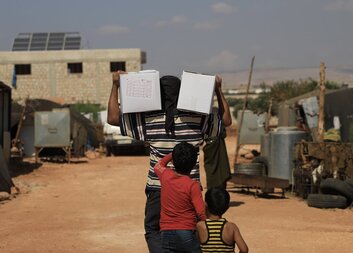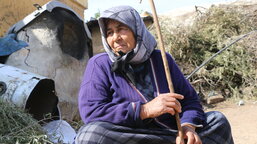Caritas Czech Republic has been operating in the Turkish-Syrian border region since 2013. In February 2023, a powerful earthquake struck Syria and Turkey. In cooperation with our local partners, we provided on-site assistance – ranging from essential material aid to hygiene kits and warm clothing. In December 2024, the government of Bashar al-Assad came to an end, leaving the country in a state of fragility. Caritas continues to closely monitor the humanitarian situation across Syria, including in areas where we are not currently operating directly. One such region is the southern province of Al-Suwayda, where both the security and humanitarian conditions have deteriorated significantly in recent weeks.
Escalation in Al-Suwayda
Since mid-July, the area has witnessed a sharp escalation in violence, with armed clashes erupting between Druze and Bedouin groups, who have been in a long-standing conflict. Syrian government forces have also become involved. Although a ceasefire was declared after one week, the security situation remains unstable. Civilians are living in fear, and humanitarian convoys are only gradually reaching the affected areas due to blockades and security risks. According to the United Nations, as of 24 July, more than 176,000 individuals had been displaced. Most remain within the province, while others are moving to neighbouring regions and rural parts of Damascus.
The healthcare system is under severe strain
Hospitals have been targeted in attacks, resulting in injuries to medical personnel and even fatalities. In some instances, armed groups have disrupted hospital operations. A lack of fuel and electricity is further complicating the functioning of medical facilities, water supply, and communication. Women and children are particularly vulnerable – facing risks of violence, abuse, and psychological trauma. Many children are unaccompanied, some have been injured or exposed to violence, and have no safe place to return to. Humanitarian organisations are reporting an acute shortage of hygiene supplies and psychosocial support.
In recent days, the United Nations Office for the Coordination of Humanitarian Affairs has conducted several visits to the region in cooperation with other organisations, aiming to monitor the situation and coordinate aid more effectively on the ground. On 31 July, forty humanitarian vehicles reached the area, delivering much-needed assistance. Mobile medical teams are providing basic treatment, psychological support, and assistance to mothers with children. In some locations, community kitchens are being established, and volunteer teams are helping register displaced families.
What challenges is southern Syria currently facing?
- Civilians are living in fear, and the situation remains unstable.
- The clashes have resulted in over one thousand casualties.
- As of 24 July, more than 176,000 individuals have been displaced.
- Access to medical care is limited and overstretched.
- There is a shortage of water, fuel, electricity, and basic necessities.
- Aid is reaching the region gradually.










